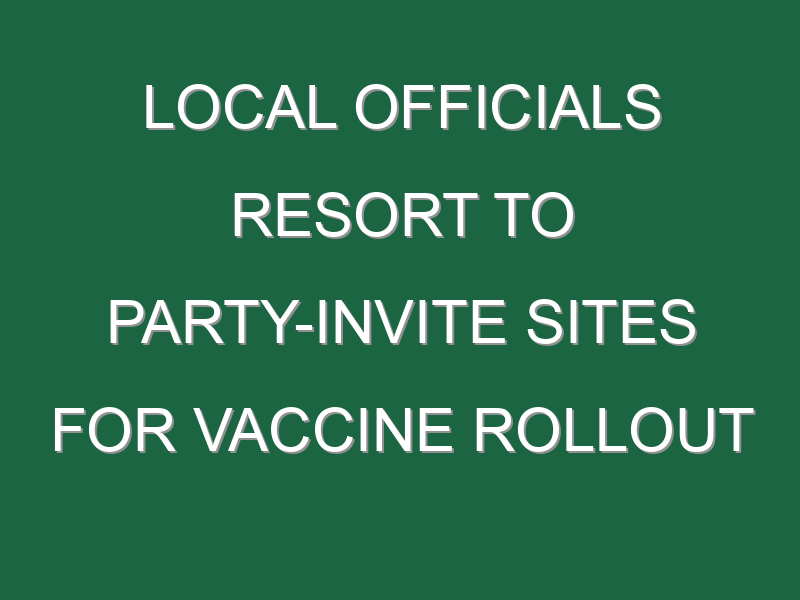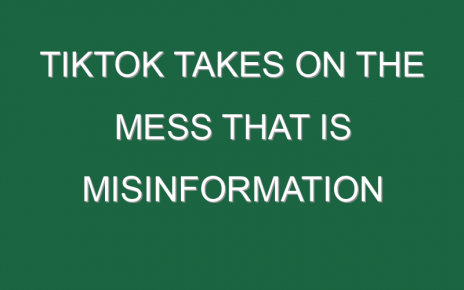It’s the most massive vaccine rollout in U.S. history, but many local governments are consigning patient appointments to web-based services better known for handling birthday-party RSVPs and online yoga sessions.
Several Florida counties have deployed Eventbrite. Some Oklahoma governments dabbled with SignUpGenius and one New Jersey county was still using the service. Elsewhere, some seekers of Covid-19 protection reported hours-long holds on appointment hotlines — only to be disconnected — or logging on to websites that lock them out.
“Signing up to get a Covid vaccine is like trying to get a Beatles ticket,” said Jacob Saur, public safety director in Florida’s Manatee County, where demand for the shot crashed the web sign-up sheet he had set up.
In its first three weeks, the effort to inoculate 328 million Americans has overwhelmed government websites and left unlucky shutouts fuming in first-come, first-served lines. The difficulty is one reason that distribution of the long-awaited vaccine is taking so long. States have also had to contend with deciding which groups have priority access, confusion over available doses and navigating the daunting logistics of providing shots that must be kept at subzero temperatures.
Overall, the U.S. has administered 4.73 million doses of the Covid-19 vaccine, but that’s just about a third of the doses distributed.
Options are often confusing. A resident of Newark, New Jersey, can sign up for a shot with the city, surrounding Essex County or the state itself. And as elderly people in Florida and Georgia wait overnight in lawn chairs at pop-up sites, other vulnerable Americans — or quite often, their tech-savvy children — are spending hours refreshing computer screens.
Florida is piloting a scheduler of its own in certain counties, Saur said. But many of his peers turned to Eventbrite because it was familiar. It also was free.
“As the state is getting vaccines, they’re pushing them out as fast as they can,” he said. “When we get a large batch, I’m not going to do a first-come, first-served. We needed a quick way to schedule these people. We aren’t large schedulers, and Eventbrite came to mind and we used it.”
Saur didn’t get much advance notice when the state started making the vaccine available to the general 65-and-over population. He said call volume and web traffic has been more frenzied than in the worst hurricanes.
Jason Salemi, an epidemiologist with the University of South Florida, marveled that even he, a health expert, couldn’t get an appointment for his parents, and had instead wasted part of a morning in a futile battle with the crashed registration page for Hillsborough County.
“I know what’s going on behind the scenes, and I’m immensely frustrated when I get to the site,” said Salemi, who runs a widely used dashboard on Florida’s Covid numbers. “I can only imagine other people who are just beside themselves.”
In Florida’s Brevard County, the government decided to use Eventbrite on Wednesday when the phone lines stopped working at the local division of the Department of Health, according to Jesi Ray, a county spokeswoman. She said it took the county about three hours to set up the event, run tests, obtain approval and put out a press release.
“We jumped on that idea,” Ray said.
The state Department of Health didn’t respond to a request for comment.
Eventbrite didn’t immediately respond to a request for comment, nor did SignUpGenius, which is courting business with a post titled “How to Organize COVID-19 Vaccine Appointments Online.” The company encourages would-be customers to buy one of its “feature-packed subscription plans,” which it says help people sign up for vaccinations and can also schedule staff shifts and manage sites.
Long night
In Hamilton County, Tennessee, which encompasses Chattanooga, there is no list at all. People eligible for early shots must show up and wait in line at a temporary site.
One 83-year-old heart and lung patient on New Year’s Eve waited in line for five hours in his car with his wife, breathing with the help of a supplemental oxygen tank. Twelve spots from the front, though, the shots ran out.
“He said, ‘I’m not doing this again — I’m not sitting in this car,’” said the man’s daughter, Kathryn Copeland, a 59-year-old real-estate agent from Orlando, Florida. He will wait, she said, until his doctor has a supply.
Health officials in Hamilton County didn’t respond to verbal and written requests for comment. Tom Bodkin, a spokesman, referred to a Friday press release that cited “unprecedented interest.”
“We ask for the continued patience of our residents as Health Department staff work through the challenges this massive undertaking brings,” the department’s administrator, Becky Barnes, said in the press release.
New Jersey, among the hardest-hit states early in the pandemic, is immunizing only health professionals and residents of long-term care facilities — in all, about 650,000 people — through at least the end of the month.
New Jersey’s statewide scheduling system went live on Tuesday, but the site went down before noon. Even before shots are available to the broad population, the state is struggling to assemble an inoculation-certified workforce, and appealing to medical retirees to help.
Meanwhile, some of the state’s 21 counties, including Essex and Passaic, are operating their own appointment websites. Hunterdon County was offering appointments via SignUpGenius, whose users more typically organize potlucks, carpools and bridal showers.
The muddled deployment effort across the U.S. adds to a series of logistical stumbles during the pandemic. Testing was initially slow to expand, and even then, the ill faced miles-long lines in their cars. Unemployment websites crashed when the virus put millions out of work.
But states weren’t blindsided by the vaccine rollout in the same way, with the federal Operation Warp Speed announced officially on May 15 — half a year before the vials started arriving.
“It just seems there’s a general lack of preparedness, even though we knew that there was a vaccine coming in the near future that would be a game changer,” said Salemi, the Florida epidemiologist. “Because of the lack of a national coordinated effort, we’re finding that we can’t get these vaccines into people’s arms.”
More health care and Big Pharma coverage from Fortune:
- The biggest conspiracy theories of 2020 (and why they won’t die)
- Timeline: From the first coronavirus cases to the first vaccinations
- Trump hyped Verily’s coronavirus testing tool. It led to less than 1% of all tests in 2020
- Commentary: Cracking the code of biological aging could solve America’s health care crisis
- Data delays aren’t slowing the global rollout of a Chinese COVID-19 vaccine




